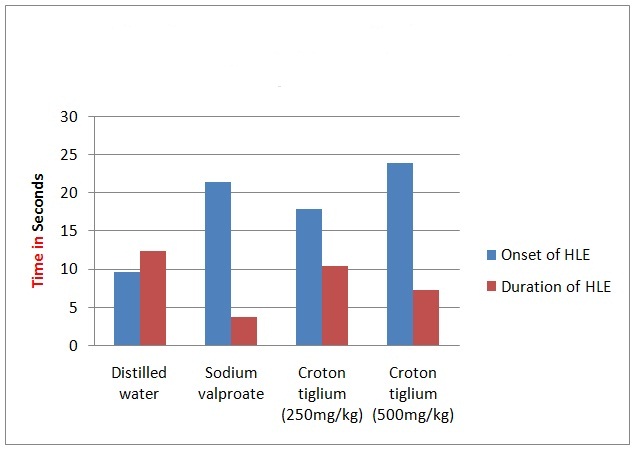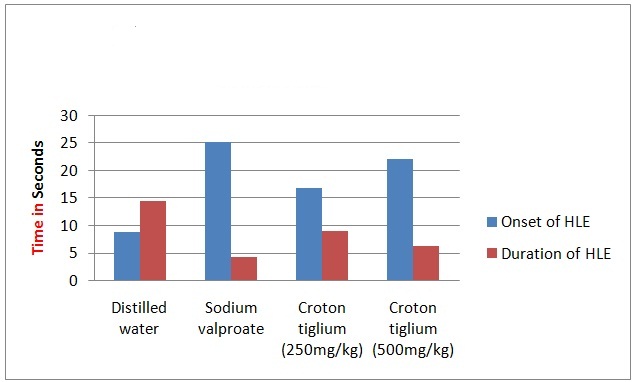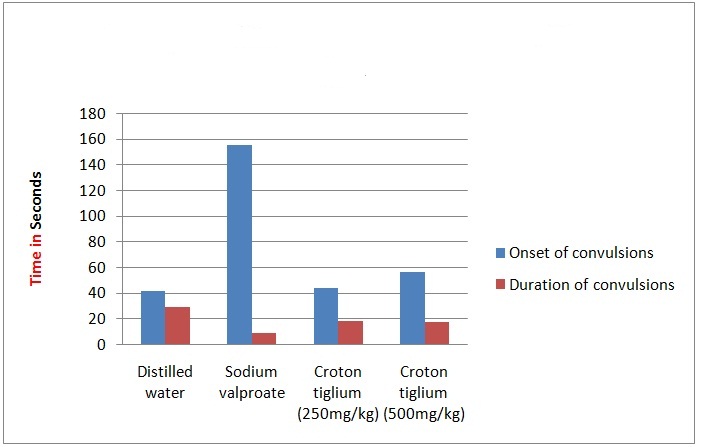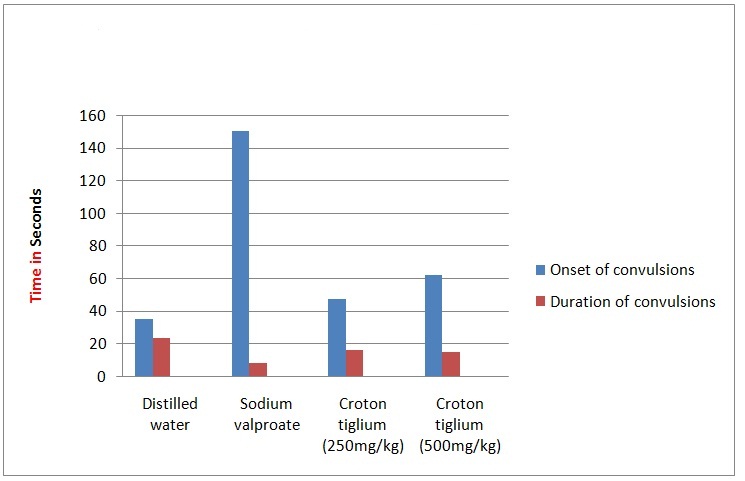Epilepsy is a paroxysmal event occurring due to abnormal, hyper synchronous and excessive electrical discharges from the cerebral neurons and produces significant amount of morbidity to the people suffering from it. Young children and adults are more prone to develop epilepsy. About 1% of the general population will experience at least one episode of seizure in their life-time [1].
Even though, there are plenty of drugs available to treat epilepsy at present, most of them are effective only in controlling seizure episode, and hence reducing the chances of further seizures because each seizure episode serves as provoking stimulus for the next subsequent episode of seizures [2]. Hence, these drugs are effective only as prophylactic agents rather than curative. Moreover, most of them are associated with significant number of adverse effects and hence there is a continuing search for new drugs which are curative and less toxic.
Experimental models commonly employed to evaluate antiepileptic activity of compounds are electrically and chemically induced convulsions in rats and mice [3]. Electrical seizures are induced by electroconvulsiometer, in which animals are subjected to non-lethal electric shock by means of electrodes applied to ear pinna or cornea whereas chemically induced convulsions are induced by using chemicals like picrotoxin and pentylenetetrazole.
One of the herbal medicine books has mentioned that the extract of croton tiglium seeds is effective in treating epilepsy. Since there are no established studies done on this plant seeds for their anticonvulsant effect, the present study was undertaken to look for its anticonvulsant effect in electrically and chemically induced convulsions in rats and mice [4].
Materials and Methods
Animals: Forty-eight rats of either sex weighing between 150 and 250gms and an equal number of mice of either sex weighing between 30 and 35gms were used for the study. Rats and mice were randomised into four study groups each for electrically and chemically induced seizure, and each group consisting of six animals. Care was taken to see that animals were housed under standard laboratory conditions. They had access to food and water ad libitum. All the experimental procedures were done during day-time, while animals were awake. The study was approved by the institutional ethical committee of Rajiv Gandhi Institute of Medical Sciences (RIMS), Andhra Pradesh, India. Care was taken to follow standard guidelines for animal care while using these animals in our experimental research.
Plant: Croton tiglium is an ever green plant of 5-6 centimetre, commonly seen in northern and southern India. It belongs to Euphorbiaceae group, and propagates through seeds and vegetative methods. It is known by different names in various languages like Jamalgota (hindi); dantibeeja (kannada); nepalamu (telugu); nervalam (tamil); jayapala (sanskrit) and nirvalam (marathi). It is bitter in taste, thermogenic, increases gastro intestinal motility, has a soothening effect on skin, reduces inflammation, expectorant and rubifacient. Traditionally this plant has been used for bronchial irritation, kidney stones, convulsions and skin disorders. It is one of the ingredients in commercially available laxative Regulax Forte, Charak Pharma Pvt Ltd, Mumbai, Maharashtra, India [4].
Drugs: Dried croton tiglium seeds were coarsely smashed, and were subjected to ethanolic extraction in Soxhlet apparatus over 48 hours [5]. The extract was then concentrated into a residual mass and dissolved in distilled water which was used as solvent so that it is easily administered to the rats and mice. Pentylenetetrazole manufactured by Sigma Laboratory, Mumbai, India was used for inducing seizures in rats and mice. Sodium valproate of Sun Pharma, Mumbai, India was used as standard drug, both for electrically and chemically induced seizures. Dosage schedule: First group (control) was given the distilled water per orally. The second group (standard group) was given sodium valproate in the dose of 200-mg/kg body weight through oral route [6]. The third group was given the test drug croton tiglium in the dose of 250mg/kg body weight per orally and the last group was given the test drug croton tiglium in the dose of 500mg/kg body weight orally [Table/Fig-1]. The dose of croton tiglium was not increased further because previous acute toxicity studies have shown that 1,000mg/kg body weight was free from mortality and toxicity [5].
Groups distribution per oral
| Drug | Dose (p.o) |
|---|
| First (Control) | Water | 0.5ml |
| Second (Standard) | Sodium valproate | 200mg/kg body weight |
| Third (Test) | Croton tiglium | 250mg/kg body weight |
| Fourth (Test) | Croton tiglium | 500mg/kg body weight |
Instrument for Electrical Model: Techno electroconvulsiometer was used to induce maximal electroshock seizures in all subjects. Electrodes were applied to both the ear pinna of animals. An electric shock of 150mAmp and 50 hertz lasting for 0.2 seconds was given to induce seizures [7]. The parameters observed were time for onset of HLE, duration of HLE and mortality of the animals over 24 hours duration. A preliminary screening test was done to include only those rats and mice which had shown HLE in this experimental model. The experimental drugs were administered one hour before giving electrical shock.
Chemical Model: Pentylenetetrazole from sigma laboratory was used to induce tonic clonic convulsions in rats and mice. Pentylenetetrazole:50mg/kg bodyweight was given through intraperitoneal route one hour following pre-treatment with respective drugs [8]. The parameters observed were time for onset of convulsions, duration of convulsions and mortality of the animals over 24 hours.
Statistics: In the tables, results for each group are expressed as Mean±SEM, and in the figures data is expressed as Mean values. For testing the significance for each group against the control group, unpaired student t-test was employed. A p-value of less than 0.05 was considered significant and a value less than 0.001 was considered highly significant.
Results and Discussion
Electrical seizures in Rats: [Table/Fig-2,3,4,5and6].
Electroconvulsive seizures - rats
| Time for onset of HLE in seconds (Mean±SEM) | Duration of HLE in seconds (Mean±SEM) | Mortality over 24 hours |
|---|
| Distilled water | 9.5 ± 0.62 | 12.33 ± 0.49 | Nil |
| Sodium valproate | 21.33 ± 0.88** | 3.67 ± 0.33** | Nil |
| Croton tiglium (250mg/kg) | 17.83 ± 0.87** | 10.33 ± 0.49* | Nil |
| Croton tiglium (500mg/kg) | 23.83 ± 0.7** | 7.17 ± 0.6** | Nil |
SEM:standard error of mean; ** p-value statistically highly significant (<0.001); * p-value statistically significant (<0.05)
Electroconvulsive seizures - mice ** p-value statistically highly significant (<0.001); * p-value statistically significant (<0.05)
| Time for onset of HLE in seconds (Mean±SEM) | Duration of HLE in seconds (Mean±SEM) | Mortality over 24 hours |
|---|
| Distilled water | 8.67 ± 0.42 | 14.33 ± 1.38 | Nil |
| Sodium valproate | 25 ± 0.82** | 4.17 ± 0.48** | Nil |
| Croton tiglium (250mg/kg) | 16.67 ± 0.88** | 8.83 ± 0.48* | Nil |
| Croton tiglium (500mg/kg) | 22 ± 1.06** | 6.17 ± 0.6* | Nil |
Pentylenetetrazole induced seizures - rats
| Time for onset of convulsions in seconds (Mean±SEM) | Duration of convulsions in seconds (Mean±SEM) | Mortality over 24 hours |
|---|
| Distilled water | 41.17 ± 3.47 | 28.67 ± 1.8 | 100 |
| Sodium valproate | 155 ± 12.01** | 8.5 ± 0.56** | 16.67 |
| Croton tiglium (250mg/kg) | 44 ± 1.69# | 17.83 ± 0.6* | 66.67 |
| Croton tiglium (500mg/kg) | 56.33 ± 1.63* | 17.17 ± 0.95* | 50 |
** p-value statistically highly significant (<0.001); * p-value statistically significant (<0.05); # p-value statistically not significant
Pentylenetetrazole induced seizures - mice
| Time for onset of convulsions in seconds (Mean±SEM) | Duration of convulsions in seconds (Mean±SEM) | Mortality over 24 hours |
|---|
| Distilled water | 35 ± 1.03 | 23.5 ± 0.85 | 100 |
| Sodium valproate | 150 ± 2.44** | 8.17 ± 0.48** | Nil |
| Croton tiglium (250mg/kg) | 47.5 ± 2.83* | 15.67 ± 1.15* | 50 |
| Croton tiglium (500mg/kg) | 61.67 ± 1.63** | 14.83 ± 0.87** | 50 |
** p-value statistically highly significant (<0.001); * p-value statistically significant (<0.05)
Electroconvulsiometer induced seizures - rats

Onset of HLE: The time for onset of tonic hind limb extension was prolonged by sodium valproate and croton tiglium and was highly significant. However sodium valproate had produced more prolongation in comparison with croton tiglium.
Duration of HLE: There was highly significant reduction in duration of HLE with both sodium valproate and croton tiglium (500mg) the effect being more with sodium valproate, while croton tiglium (250mg) had only significant reduction of duration of HLE.
There was no mortality among rats over 24 hours both for croton tiglium and sodium valproate.
Electrical Seizures in Mice: [Table/Fig-3–7].
Electroconvulsiometer induced seizures - mice

Onset of HLE: The time for onset of tonic HLE was prolonged by sodium valproate and croton tiglium and was highly significant. Even though croton tiglium produced dose dependant prolongation of time of onset of HLE, the effect was less compared to sodium valproate.
Duration of HLE: While croton tiglium (250mg) and croton tiglium (500mg) had produced only a significant reduction of duration of HLE, it was a highly significant reduction seen with sodium valproate. There was no mortality among mice over 24 hours both for croton tiglium and sodium valproate.
Pentylenetetrazole Induced Seizures in Rats: [Table/Fig-4–8].
Pentylenetetrazole induced seizures - rats

Time for onset of convulsions: The prolongation of time for onset of convulsions was statistically highly significant with sodium valproate, only significant with croton tiglium (500mg) and insignificant with croton tiglium (250mg).
Duration of convulsions: There was highly significant reduction with sodium valproate but only a significant reduction by both doses of croton tiglium. The mortality rate among sodium valproate group was 16.67% while mortality in croton tiglium 250mg and 500mg, was 66.67% and 50% respectively.
Pentylenetetrazole Induced Seizures in Mice: [Table/Fig-5–9].
Pentylenetetrazole induced seizures in mice

Time for onset of Convulsions: With both sodium valproate and croton tiglium (500mg) it was prolonged highly significant whereas with croton tiglium (250mg) the prolongation was only significant.
Duration of Convulsions: The reduction in the duration of convulsions by sodium valproate was highly significant. However croton tiglium had comparable and significant reduction in duration of convulsions.
There was no mortality in the sodium valproate group. While mortality in croton tiglium groups in both the doses was 50%.
Limitations
Even though animal models of epilepsy are good for studying the effects of anticonvulsant drugs, all have inherent limitations. Conclusions from laboratory work extend only as far as the models reflect real epilepsy in the clinical setting. In contrast to clinical experience, seizures in a large number of animal models can be manipulated by external stimuli, such as sound, novel environments, tactile stimulation [9], leaving some degree of uncertainty of specific effects of localized stimulation in behaving animals. Sometimes, the older equipment, the leakage currents and other technical issues may contribute to erratic findings [10] Often, chronicity of animal studies is short in comparison to potential treatment in patients lasting years, resulting in some uncertainty of long-term risks of long stimulation with consideration of kindling (depending on site of stimulation), gliosis or neuronal damage [11].
Conclusion
Croton tiglium had shown dose dependant anticonvulsant effect in electrically induced seizures, however it was inferior to sodium valproate. In pentylenetetrazole induced seizures; the anticonvulsant effect of croton tiglium was much lower when compared to sodium valproate, and there was higher percentage of mortality in croton tiglium treated groups.
SEM:standard error of mean; ** p-value statistically highly significant (<0.001); * p-value statistically significant (<0.05)
** p-value statistically highly significant (<0.001); * p-value statistically significant (<0.05); # p-value statistically not significant
** p-value statistically highly significant (<0.001); * p-value statistically significant (<0.05)